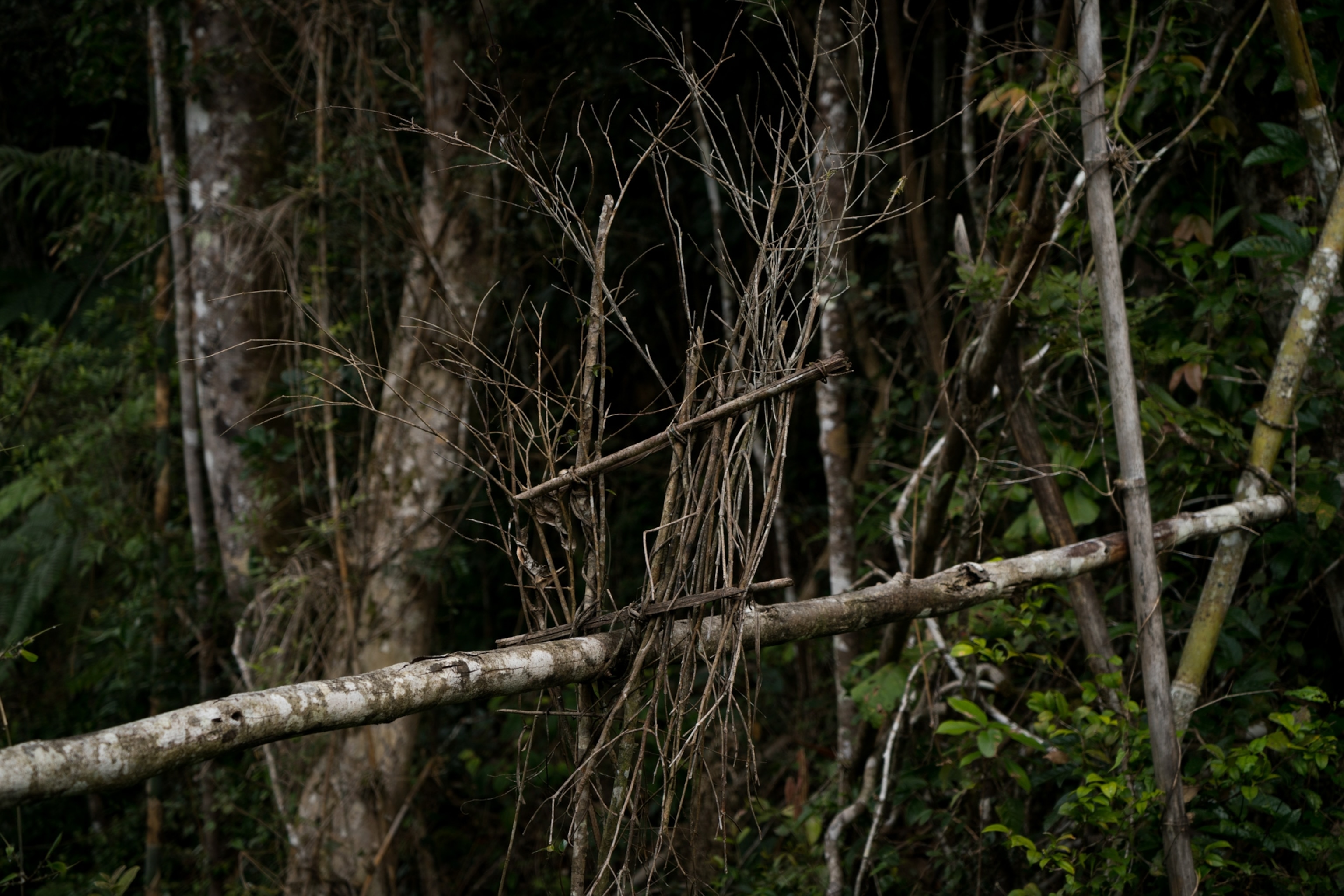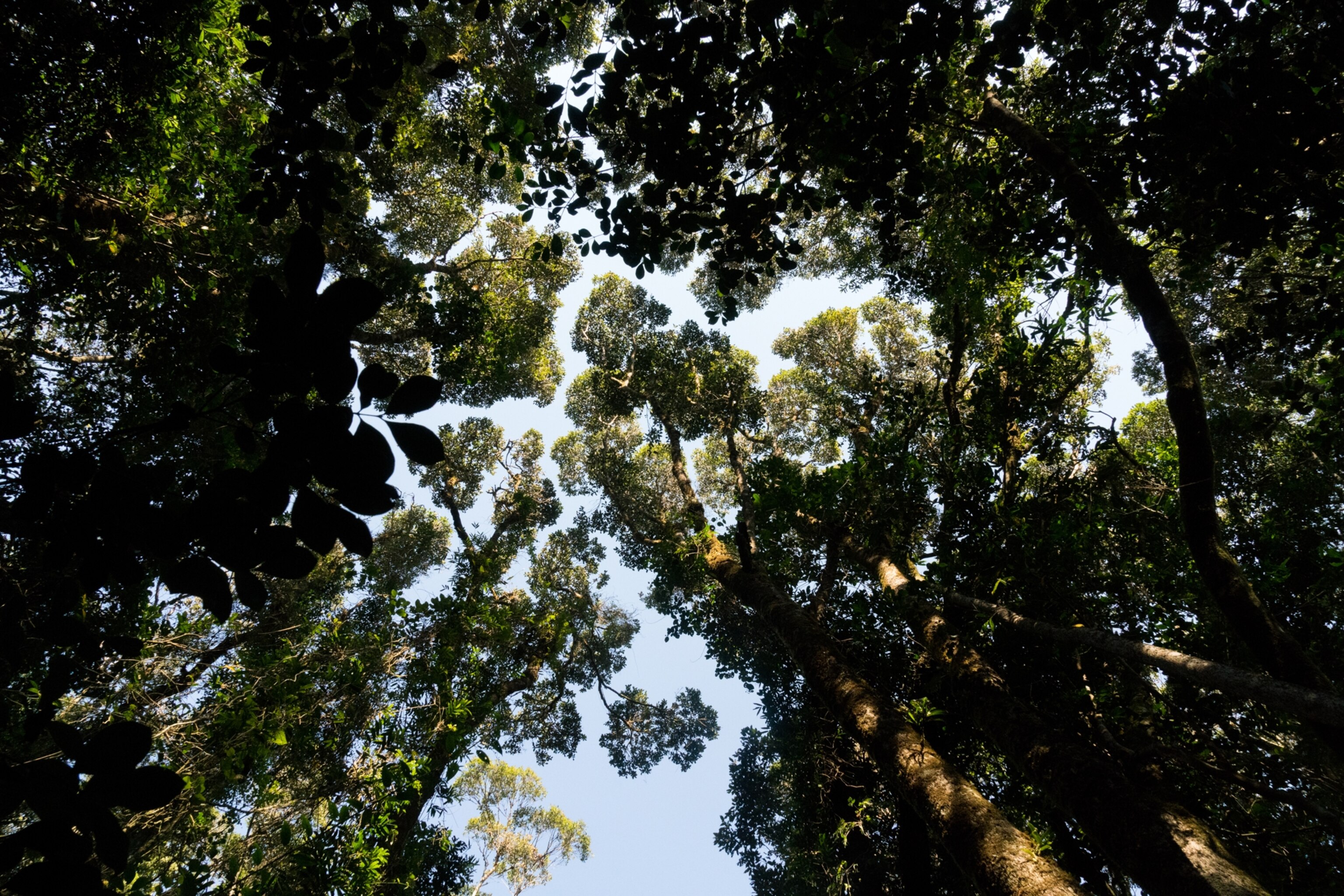
Madagascar’s endangered lemurs are being killed during pandemic lockdowns
Early data paints a troubling picture for these animals and their habitat.
Tiana Andriamanana was alarmed when she saw the fires swallowing Madagascar’s forests in March. She’d grown used to seeing illegal burns for agricultural expansion, but such widespread blazes so early in the year were extremely unusual.
The burning intensified in late March, after the nation’s coronavirus lockdown was announced. People began fleeing its capital, Antananarivo, and other cities, boarding crowded vehicles bound for rural areas. They hoped “they could work the land and then produce a yield that would help them survive the health and economic crisis,” says Andriamanana, executive director of Fanamby, a Madagascan conservation nonprofit responsible for managing five protected areas.
But working the land to grow food crops such as rice, peanuts, and maize means clearing trees. Soon, clouds of smoke—signs of illegal burning—were wafting above protected areas. In some parts of the country, more people began felling trees to burn and convert the wood into charcoal, a fuel source lighter and easier to carry than firewood.
All this illegal activity in Madagascar’s forests is especially worrying to Andriamanana and other conservationists because of the grave situation facing the island’s 107 species of lemurs—forest-dwelling primates with saucer-like eyes, long muzzles, and furry tails found nowhere else on Earth. Nearly a third of them are critically endangered, and most of the rest are considered threatened, largely because of deforestation in recent decades.

Madagascar’s geographic isolation and varied forest types have spawned a biological wonderland, home to thousands of endemic animals and plants that, like the lemurs, are facing pressure from humans.
Many lemur researchers left the country in March; others have been unable to travel to the remote areas where they usually work. But unpublished field reports from forest conservation patrols working with Madagascar officials, household surveys conducted by Madagascan research teams, and analysis of satellite imagery reveal a worsening situation for lemurs not only from losses of habitat but also from increased illegal hunting.
Madagascar is one of the poorest nations in the world. Malnutrition is widespread, with almost one of every two children under the age of five suffering from stunted growth. Many people in rural areas have depended on hunting forest animals for food, but with deepening poverty caused by the pandemic, lemurs are a more frequent source of meat, according to Cortni Borgerson, an anthropologist at Montclair State University, in New Jersey, who focuses on hunting and consumption of lemurs.
Before the pandemic, tourism was a cornerstone of Madagascar’s economy, supporting more than 300,000 jobs, and lemur-watching was popular. Tourism revenue amounted to about $900 million a year in a country where most people live on less than $2 a day. Yet without international flights, many of the nature guide jobs dried up, as did employment for cooks, hotel workers, and many more. Without a steady income, people have turned to the forests for food and fuel.
(Related: Read how Madagascar’s tourism drought affects conservation on the island.)

“COVID has created a serious setback because of the temporary cessation of ecotourism, which is the lifeblood of some of the communities,” says Russell Mittermeier, chief conservation officer for the nonprofit Global Wildlife Conservation and chair of the primate specialist group for the International Union for Conservation of Nature’s Species Survival Commission.
“People working in conservation are trying their best,” Andriamanana says. “It is a mess—but it’s a mess everywhere due to COVID-19.”
Falling trees
Of all the threats to Madagascar’s lemurs, additional clearing of trees is the most ominous, according to Edward Louis, a leading lemur researcher and director general of the Madagascar Biodiversity Partnership, a regional NGO.


If one person chops down two or three 50-year-old trees in a day—a typical number, Louis says—the cumulative reduction of lemur habitat can be disastrous. As patches of forest shrink, fragmentation isolates populations, leading to inbreeding. In addition, Louis says, too little habitat can trigger territorial disputes, sometimes leading male lemurs to kill young animals that are unrelated to them.
Getting a clear understanding of the extent of deforestation—and the resulting loss of lemur habitat—is challenging, especially during the pandemic. Country-wide satellite imagery for 2020 won’t be available until May 2021 at the earliest, based on the timeline of years past, says Lucienne Wilmé, national coordinator for the Madagascar program for Global Forest Watch, an online forest monitoring effort that provides worldwide data on deforestation.
“The Global Forest Watch data is based on percentage of canopy cover, so if there’s a hole in it, you can see it,” Wilmé says. But “holes” in the forest may not signify the absence of trees; they may instead show places where trees that lose their leaves at different times of the year appear to be missing. “It’s very complicated and very different from one forest to another,” she says.
To provide a more complete picture, the organization also relies on supplementary reports and field observations from regional research groups and nonprofits. That ground-based work—demanding in remote, hard-to-reach parts of the country—has become even more difficult during the pandemic because of travel restrictions. In addition, the unreliability of internet service can make data sharing almost impossible, Wilmé says.
According to Andriamanana—based on tracking of the roughly 1.5-million acres of protected land managed by Fanamby—deforestation has increased an average of 10 percent since 2019. By early October, the group estimated that more than 120 acres had been cleared illegally.

Although that small number may seem insignificant, it isn’t, Andriamanana says. Most of the losses occurred in Alaotra-Mangoro, in eastern Madagascar, and Menabe, in western Madagascar. These regions are home to critically endangered species including the Indri indri, largest of all the lemurs, and Microcebus berthae, a mouse lemur so small it can fit in the palm of your hand.
Andriamanana expects to tally additional reductions from the more frequent illegal burns that typically occur around October and November before the start of the rainy season.
The numbers lost match the numbers eaten.Cortni Borgerson, National Geographic Explorer
Deforestation has also intensified in some parts of the 43 protected areas, encompassing 4.2 million acres, managed by Madagascar National Parks says Mamy Rakotoarijaona, its director general. In an average year about 17,000 acres of forest are lost, according to Ollier Duranton Andrianambinina, head of the parks’ department of communication and information systems.
But this year, Andrianambinina says, they’re worried that the losses will be greater. Even though Madagascar National Parks deployed new technology in 2019 to improve forest alerts for fires and surveillance, the pandemic has curtailed ranger patrols.
Charcoal rush
Despite coronavirus travel restrictions and laws prohibiting felling trees in protected areas, impoverished people in southern towns have been traveling to forest preserves in the north to find jobs cutting timber for charcoal, according to the Madagascar Biodiversity Partnership’s Edward Louis. “It’s a big business and people now just need income.”
His organization has been working with local officials to conduct ranger patrols in Montagne des Français, a protected area of dry forest in the north, and in Kianjavato, a protected area in the southeast where the nonprofit is working to preserve a corridor linking remaining areas of natural forest.
In Montagne des Français, the exclusive habitat of the northern sportive lemur—a seven-inch tall, grayish-brown animal known for its shrill screams—patrols have identified areas newly denuded for charcoal production. About 80 percent of these sportive lemurs have been wiped out during the past two decades because of habitat loss and hunting, and fewer than a hundred are thought to survive today.
“I just came back from Manombo forest in the southeast and saw the [forest] special reserve burning every day, which makes me very sad because I have conducted lemur research in that forest since 1997,” Jonah Ratsimbazafy, a Malagasy primatologist and president of the International Primatological Society, a research and conservation organization, said in late November.
As the pandemic rages on, “the next six months or so will be critical for all of Madagascar,” says Louis, who, though currently based in Nebraska, is in constant touch with his teams in the country. The demands for trees and meat are continuing, and the long-term effects of habitat losses on lemurs may not be apparent for some time to come, he says.
Lemurs to eat
Before COVID-19 took hold, lemurs and other forest animals, including cat-like fossas and small, shrew-like tenrecs, had long been taken for food, although hunting lemurs has been outlawed since the 1960s.
Anthropologist and National Geographic Explorer Cortni Borgerson estimates that at least 1,600 red ruffed lemurs and 10,000 white-fronted lemurs were killed and eaten each year before the pandemic.
(Related: How pandemic-induced poaching has surged in Uganda and threatened conservation efforts in Kenya.)
Borgerson says her most recent, yet-to-be-published analyses reveal a troubling trend: Families desperate to feed themselves or sell meat in local markets are turning increasingly to hunting. She says populations of the critically endangered red ruffed lemur and threatened white-fronted lemur, in particular, are at their lowest levels in 10 years.
Based on current reports from her research teams around Masoala National Park, where she’s worked for nearly 15 years, Borgerson estimates that the density of white-fronted lemurs in the region has fallen by 56 percent—from more than 20 animals per square kilometer in 2019 to fewer than 10 this year.

What’s happening to these disappearing animals is not a mystery. “The numbers lost match the numbers eaten,” she says. Borgerson arrived at this conclusion after matching weekly data from people’s self-reporting about household food consumption collected by her research teams and comparing that information with lemur density counts.
The red ruffed lemur population density has also dropped—on average by 63 percent in just the past year, Borgerson says. Most of that loss stems from habitat loss, she believes, and about a quarter from hunting.
Reports from Ollier Duranton Andrianambinina, of Madagascar National Parks, appear to corroborate Borgerson’s findings—they, too, indicate heightened lemur hunting. From January to September of this year, their patrols have seen increases in hunting well above the norm—564 lemurs caught in traps and 132 instances when they encountered people hunting.
Aubin Andriajaona, the Madagascar Biodiversity Partnership’s site manager for Montagne des Français, says deforestation there was “very up” from March to June and that patrols in the area sometimes came across lemur body parts and bits of fur.
Raising awareness, providing options
Tiana Andriamanana says Fanamby’s patrol teams sometimes come across people who are unaware that burning trees is illegal. When that happens, she says, the teams have the discretion not to arrest them but to explain that such burns are illegal and why the trees are valuable.
The pandemic underscores the need to reduce reliance on ecotourism jobs and create other employment opportunities to alleviate the poverty driving illegal behavior, she says.
Louis agrees. He suggests that existing businesses—the manufacture of essential oils and aromatherapy products, as well as the production of vanilla, coffee, and mangos—should be further developed and organized into consortiums.
But to protect lemurs and help preserve Madagascar’s remaining wilderness, the most urgent need is to bring the pandemic under control, he says. Reforestation will remain a priority to replace what’s been lost—reconnecting fragmented lemur habitat and expanding buffer zones around protected areas.
“We need to make local communities self-sufficient in terms of food security and health security,” Andriamanana says. “If we don’t have that, then they will always tap into the forest.”